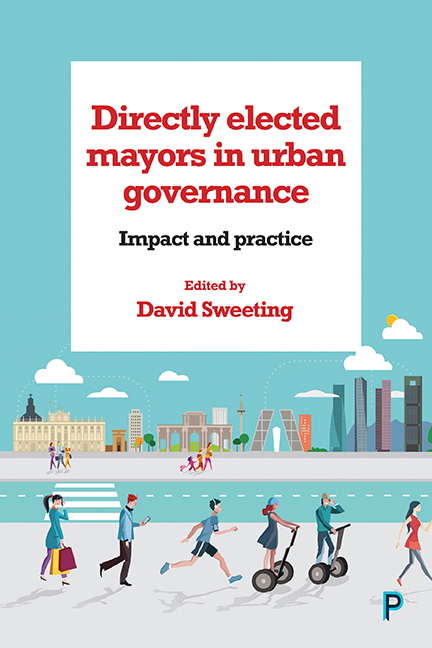nine - Directly elected mayors in New Zealand: the impact of intervening variables on enhanced governing capacity
Published online by Cambridge University Press: 05 April 2022
Summary
Introduction
Direct election of mayors has been established fairly widely in local government in New Zealand since the late 19th century and mandatory since 1989. While unique and specific historical factors led to the widespread adoption of directly elected mayors, the New Zealand experience may offer insights for comparative studies into their effectiveness. New Zealand has units of local government in which the political leader is either directly elected (city/district councils) or is elected by fellow councillors (regional councils), and there is thus also the possibility of making comparisons internally, within New Zealand. Recent legislative reform has encouraged council reorganisation and rationalisation. The creation of a unitary council for Auckland in 2010 is a notable example. Further unitary councils were anticipated and have been encouraged through reorganisation proposals by the Local Government Commission. Interestingly, however, there seems to be a lack of public appetite for larger, unitary councils and amalgamation plans for three regions (Northland, Wellington and Hawkes Bay) have been rejected. For example, in June 2015 the Local Government Commission recommended a unitary council for the Hawkes Bay region. This was subject to a majority vote in a poll held in mid-September 2015. Two thirds (66%) of voters rejected the proposal and the status quo prevails.
Interest does remain in some other regions (such as Waikato and Bay of Plenty) but with local elections taking place across all councils in 2016 further progress has been halted, at least until after new councils are formed in late 2016. In the meantime, therefore, New Zealand local government has a mixed model of regional leadership. Auckland has a directly elected mayor while other regions have chairs elected by councillors.
Alongside this recent legislative reform has been a strengthening of mayoral power. It is clearly intended – at least by the sponsor of the amendments – that the governing capacity of the Auckland ‘metro mayor’ model, which was expected to become established in other parts of New Zealand, should be enhanced. However, changes to the draft legislation when it was before a select committee weakened some of provisions that would have strengthened the mayor's powers and retained some existing powers of the wider council.
- Type
- Chapter
- Information
- Directly Elected Mayors in Urban GovernanceImpact and Practice, pp. 139 - 158Publisher: Bristol University PressPrint publication year: 2017

